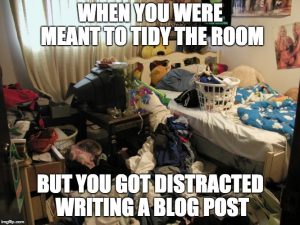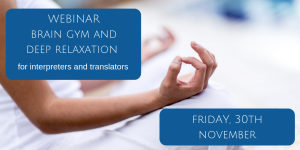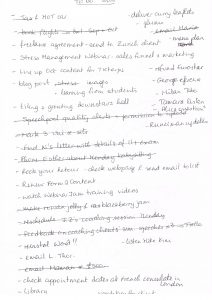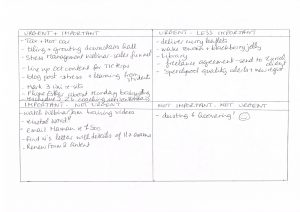I’m first and foremost an interpreter and trainer, but some of you may know I have a background in fitness training and complementary therapies.This means I’ve always had an interest in stress management and relaxation, which has led to developing webinars and seminars about self-care for interpreters.
Generally, I like to think I manage stress quite well.
However, the pandemic and lockdown have meant I’m less this:

… and more like this:

The pandemic has challenged all of us in many ways, and I won’t dwell on them here except to say homeschooling? Just no. According to my children, that is. Personally, I quite enjoyed learning about the Black Plague and prime factors, although it did, admittedly, make it almost impossible to get any actual work done!!

And breathe…
Now, I recently asked my interpreter trainers’ Facebook Group what they were most stressed about, and the responses were partly to do with factors beyond the respondents’ control and the reliability of the technology we’re now all dependent on, and partly related to the fact we’re joined at the hip with computers for hours every day, with resulting effects on fatigue, eyesight, and our hearing.
Pausing for a moment to give some thought to how interpreters have been affected by the pandemic and the resulting switch to home working (either in the form of RSI or attending training sessions online, teaching online, translating from home, etc.), I’ve drawn up a list of some of the main consequences of the fact that we’re more sedentary, more uncertain about the future, and largely glued to a computer screen.
- stress and anxiety: the causes are obvious, from fear about coronavirus to anxiety about our professional future, career prospects, and income.
- headaches: stress-related or caused by a poor home office set-up, bad sound when attending Zoom or other meetings, or eye strain from staring at a screen for hours.
- dry, tired eyes: too many hours in front of a screen, exacerbated by poor lighting in the home office.
- back, shoulder or neck pain or stiffness: from hunching over a laptop, an unergonomic set-up in the home office, or sitting down for too many hours every day.
- tinnitus or other hearing problems: caused or exacerbated by stress or poor sound.
- weight management issues: arising from different dietary habits due to lockdown, being less active, and feeling more stressed.
Now, I’m not saying everyone is experiencing all of these. Some people have taken the lockdown as an opportunity to get fit, quit drinking, clean up their eating habits, learn a language, and take up fantastic new hobbies. Kudos to them!
But if you’re finding it difficult, I’d like to share a few tips about self-care for interpreters.
When I first started thinking about this blog post, I instinctively thought of the simplest, most important tips for good health; those that underpin everything else. Because there’s little point twisting yourself into a pretzel with yoga, or getting a delightful back massage, if the basics aren’t in place.
However, it’s true that the basics sound…well…rather dull: get enough sleep. Drink enough water. Eat healthily.
Everybody knows all of this, right?
And yet, plenty of people don’t do these things, or they don’t understand the full benefits.
Self-care for interpreters
So I decided to list for you my 5 self-care supertips, which are highly effective if you’re consistent with them, as well as being multi-purpose.
Yes: apply these 5 tips, and you’ll be addressing several of the stressors I identified above in one fell swoop! All these tips are simple, easily integrated into your lifestyle, and don’t take a lot of time. And perhaps when you’ve read the explanations, you’ll agree that they’re worth trying out, rather than dismissing them for being too basic.
Water
Drink enough water.
I’m sure you’ve heard that even mild dehydration can affect your energy levels. In fact, it can lead to increased feelings of fatigue, and, importantly for interpreters, reduced focus and alertness, and reduced short term memory.
Dehydration can also contribute to headaches and increase your body’s production of the stress hormone cortisol. There’s a bit of a vicious circle here: stress causes dehydration, and dehydration adds to stress.
Now, once upon a time when we were all working in the booth, I’m not sure this was much of a problem, because we all had a bottle or cup of water. But perhaps you’re like me, and you find it hard to drink enough when you’re at home.
If so, here are some simple tricks:
- measure out 1.5 l – 2 l water into a large bottle or jug in the morning. That way, you know how much to aim for during the day.
- Add something more interesting if you’re not a big fan of plain water (by which I mean slices of cucumber, lemon or strawberry, not gin!).
- Drink herbal teas – they’re also a nice opportunity to take 5 minutes and clear your mind.
If you prefer high tech solutions, you can use reminder apps such as Waterly or My Water – Daily Water Tracker.
Sleep
Sleep enough.
Again, you’re probably thinking this is fairly basic advice. Everybody knows that you need to sleep enough to feel less tired.
There’s a little bit more to it, though.
Inadequate sleep can actually increase your body’s production of stress hormones. There’s another vicious circle at play here: stress can interfere with good sleep, but poor or insufficient sleep messes with your stress hormones (especially cortisol).
Elevated cortisol levels, in turn, can lead to insulin resistance and weight gain (among other nasties like compromised immune system, chronic inflammation, and chronic disease).
There’s a lot to say about improving the quality of your sleep. I’ll stick to just two points here:
- your sleep before midnight is more restorative.
- the consistency of your sleep patterns is important, so try to get to bed and get up at roughly the same times.
Eat for energy
Being stuck at home during lockdown can be a double edged sword when it comes to eating healthily.
On the one hand, you’re at home, potentially with a fridge stocked with healthy veggies, and the ability to whip up nourishing, nutrient-rich meals.
Or, you’re a mixture of bored and anxious, a packet of biscuits always within easy reaching distance, none of your usual daily structure, and plenty of reasons to comfort eat.
Take your pick. I know which side I’m on, alas.
Diet could be the subject of not one, but an infinite number of blog posts, so I’ll offer just one main tip:
Consume protein at every meal or snack.
Why? Because protein will help you keep your blood sugar levels steady, so you’re less likely to reach for extra snacks or eat compulsively, and less likely to feel anxious.
Protein is also filling (more so than carbohydrates), so it helps you avoid overeating.
When I mention protein snacks, people often ask me what that might look like. After all, if muffins, cakes and biscuits are off the menu (or reserved for an occasional treat), most people will probably go for a fruit (high in sugars) instead.
Of the many options, some of which may seem very unusual (a boiled egg as a snack?? A chunk of cheese?), one that I think works well at home is yoghurt. Specifically, plain Greek yoghurt (0% fat). It has a very creamy texture and is very filling, but it’s also low fat, relatively low in carbs, high in protein, and – surprisingly – good for your teeth (because of the probiotics it contains, and because calcium-rich foods protect teeth from erosion caused by acidic environments). You can always add a dash of cinnamon, a dusting of cocoa, or a few drops of Stevia if you like it a little sweeter.
Take short, regular breaks from the computer
Sitting at a computer for hours at a time can easily cause you eye strain, neck strain, headaches, and potentially hearing problems (depending on the quality of sound you’re getting).
Take regular breaks!
If you’re staying seated in your home office, try this:
- do a few seated stretches to work the stiffness and kinks out of your neck.
- Spend 20 seconds looking at something 20 feet away (ideally, you should do this every 20 minutes!), to make sure your eyes get a break from focusing on the same point all the time.
- Close your eyes, drop your shoulders, take 3 deep breaths, and try a short mindfulness exercise. Focus on each of your senses in turn, and ask yourself: What can I hear? What can I smell, taste, see, and touch?

If you’re able to leave your desk, so much the better! Go outdoors and focus on something in the distance to give your eyes and ears a break. Ideally, get some exercise, which has proven effects on stress levels, mental health (e.g. depression), weight management, and more. The fight or flight response caused by stress puts pressure on nerves and blood vessels, which in turn can affect the inner ear and cause tinnitus. Conversely, exercise is good for your ears! Cardio (walking, running, cycling) can help the internal parts of your ears stay healthy and work to their full potential, as long as you don’t strain or hold your breath. Or listen to incredibly loud music in the gym.
Make your office more ergonomic
You could do an hour of stretching every day, but it would have little effect if your office isn’t set up properly.
Having your device screens at the wrong height or in the wrong place, using a chair that can’t be adjusted to your height, having the wrong kind of lighting in the office, and using a keyboard that doesn’t suit you are all things that can contribute to lower back pain, neck pain, wrist pain, eye strain, and headaches.
Many physiotherapy clinics now offer home office ‘check-ups’ by video link, so you can have an expert assess your workspace and let you know what changes you can make.
I promised you 5 supertips for self-care, and you’ve had them, but I’ll throw in a sixth as a bonus for you to think about – the underlying evidence is less persuasive, though.
Use a humidifier
Whether it’s because of dry air caused by your central heating during the colder months or lack of moisture in the atmosphere because of the climate where you live, your health can be affected in a number of ways, the most obvious of which include headaches, sinus problems, a dry throat, and irritated eyes.
You may find a humidifier helpful in your home office to counteract the effects of dry air and the associated symptoms.
Caveat: too much humidity is as bad as not enough, and your humidifier must be kept scrupulously keen. It’s also not a good solution for those with allergies or asthma.
Want to find out (much) more?
A short blog post doesn’t give me enough scope to investigate the ways in which our current lifestyle, and the pandemic, are affecting our stress levels and health as interpreters.
I’d love to share more tips and knowledge with you.
In order to do that, I’m organising a Virtual Summit for interpreters from 11th-13th January.
The whole first day is devoted to self-care for interpreters!
I couldn’t be more excited about my lineup of speakers. You’ll be hearing from a vocal coach, a Pilates teacher, a nutritionist, and a physiotherapist.
You’ll have an opportunity to try out yoga for back health, a sound bath, some vocal warm-ups, relaxation exercises, and more. We’ll be discussing how to improve your interpreting with movement, how to organise your office ergonomically, how to eat for energy, how to avoid lower back problems, how to manage your stress effectively, how to assess whether you’re looking after your ears adequately, how to boost your confidence, and much more.
All of the sessions have been designed specifically with interpreters in mind, and you’ll be walking away with practical information and action steps to help you make changes straight away.
If you’d like to be the first to know when registration is open and free tickets are available, click on the button!
p.s. there are plenty of treats in store on days 2 and 3 as well, when our focus changes and we’ll be tackling tech, business skills, and how to take the next steps with your interpreting skills.
References:
https://www.news-medical.net/health/How-Does-Mild-Dehydration-Affect-the-Body.aspx
https://www.webmd.com/diet/features/water-stress-reduction#
Interactions between sleep, stress, and metabolism: From physiological to pathological conditions
https://www.psychologytoday.com/gb/blog/sleep-newzzz/202004/the-effects-cortisol-your-sleep

Sophie Llewellyn Smith, writing as The Interpreting Coach, is a coach, interpreter trainer, conference interpreter, designer of online teaching materials, and creator of Speechpool. Follow the blog to pick up tips on how to improve your interpreting skills, and check out the website for digital material to complement your face-to-face learning and empower you to take control of your learning.
If you’re interested in personal coaching, why not book a free discovery call?
















